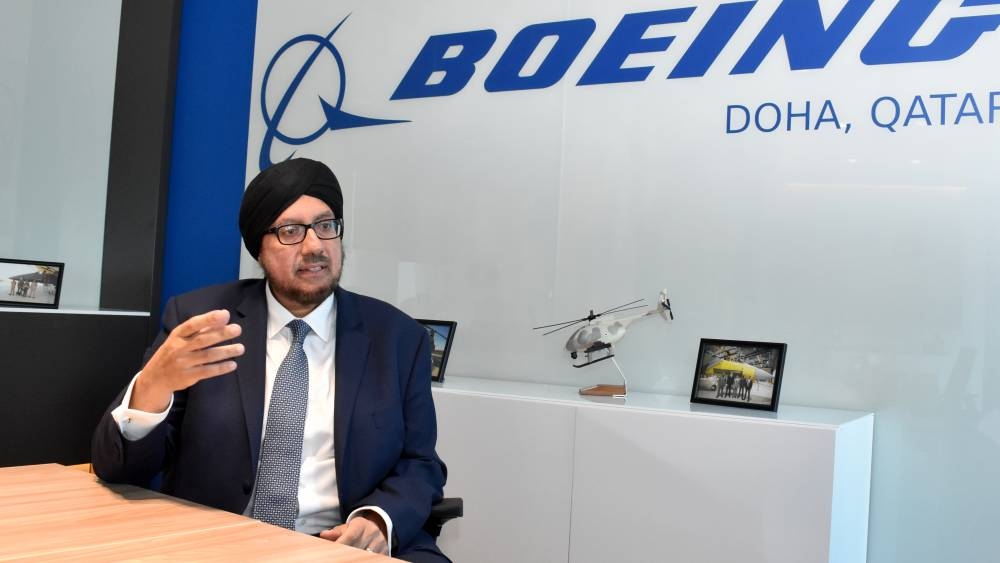Boeing has a “very significant” growing commercial customer in Qatar Airways that is going to be the launch customer of some of its “newest and most innovative” products, noted company’s president in the Middle East, Turkiye and Africa, Kuljit Ghata-Aura.
“We are proud to have been part of Qatar Airways’ success story. Since our partnership began (in 2006), Qatar Airways has made landmark orders of Boeing 777s, 777 Freighters, 777Xs, 737 MAXs, 787 Dreamliners and 747-8 Freighters.
“As the launch customer of the new 777-8F, we recently announced two very significant deals for 74 777X passenger and freighter airplanes, and up to 50 737-10 passenger airplanes. In April, Qatar Airways took delivery of its first 737-8 airplane,” Kuljit said in an exclusive interview with Gulf Times in Doha.
Currently, he noted, Qatar Airways operates more than 130 Boeing airplanes: three 737-8s; 89 777s, including 27 777 freighters; 41 787s; three 747 Boeing Business Jets and two 747-8 freighters.
Kuljit noted Qatar Airways has more than 120 Boeing airplanes on order books, which include 74 777Xs; 19 787-9s; two 777 freighters, 25 737-10s and six 737-8s.
In 2013, Qatar Airways ordered 60 777X new widebody airplanes. In January 2022, Qatar Airways expanded its commitment to the 777X family by becoming the launch customer for the newest 777-8 freighter, with a confirmed order of some 34 airplanes and options for an additional 16 freighters.
In July 2022, Qatar’s national carrier committed to up to 50 Boeing 737-10s with a firm order for 25 airplanes and options for 25 more.
In April this year, Qatar Airways took delivery of its first 737-8, the first Boeing single-aisle airplane in the airline’s fleet.
“These new airplanes will support Qatar Airways as it expands its passenger and cargo capacity. Boeing is also supporting Qatar Airways Cargo in developing ‘connected cargo’ solutions to enable greater operational efficiency with a focus on the 777-8 freighter,” he said.
During the FIFA World Cup Qatar 2022, Kuljit noted a dedicated team of 60 professionals was deployed to Doha to support airline customers with everything they needed to ensure a safe and timely service for the tournament.
He said Boeing provides support to the Qatar Amiri Air Force by facilitating iconic platforms such as the F-15QA (Qatar Advanced) fighters, the C-17 Globemaster transport airplanes and the AH-64 Apache.
All of them have been utilised to protect Qatar’s air, land and sea borders and have been deployed to conduct humanitarian missions across the globe and surveillance missions in Qatar during large-scale events like the 2022 FIFA World Cup.
The F-15QA fleet conducted 52 sorties and the AH-64 Apache accomplished 96 missions during the 2022 FIFA World Cup in Qatar.
Kuljit said Boeing works closely with the Qatar Amiri Air Force, providing training and sustainment for the C-17 fleet.
Boeing is also providing spare parts, support and test equipment, maintenance support, performance-based logistics, training devices, and aircrew and maintenance training for Qatar’s fleet of the AH-64 Apache helicopters.
In addition, Boeing is providing in-country spare parts, maintenance, training, programme management and logistics support for the F-15QA fighters.
To ensure mission readiness and smooth support of all defence platforms, Boeing is growing its employee base in Qatar, he pointed out.
On Boeing’s global production rates, he said, “On 737, we are transitioning production to 38 airplanes a month. As we move to the higher rate, we will continue to prioritise stability. We still plan to increase to 50 airplanes per month in the 2025/2026 timeframe.
“On 767, the current rate is three a month, while on 777/777X – it is also three a month. We have said our plan is to go to four a month in the 2025-2026 timeframe.
“On 787, we are producing at four a month and still plan to reach five a month by the year-end. We have said our plan is to get to 10/month by the 2025-2026 timeframe.”
On supply chain issues impacting the airline industry, Kuljit noted, “At Boeing, we continue to focus on driving stability in our production system, including closely partnering with our suppliers to address challenges, meet our customer commitments and prepare for future rate increases. Our objective is unchanged: a healthy and stable production system.
“There’s progress in many areas of the supply base, however we expect supply chain challenges to continue well into 2024. We continue to work through supply chain challenges on a case-by-case basis.
“We regularly monitor our suppliers across the globe, including our sub-tier supply chain, to ensure their deliveries support our current and future airplane production needs. This includes a variety of different approaches, from top leadership engagements to daily communications to onsite and embedded teams, all ensuring alignment and stable, predicable execution.
“We have also ramped up internal fabrication for surge capacity and increased inventory of select parts for risk protection,” he added.

“We are proud to have been part of Qatar Airways’ success story. Qatar Airways is going to be the launch customer of some of its newest and most innovative products,” says Boeing president in the Middle East, Turkiye and Africa, Kuljit Ghata-Aura. PICTURE: Thajudheen

